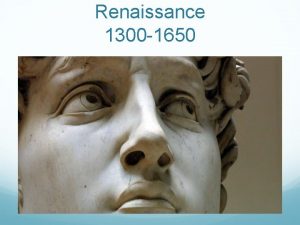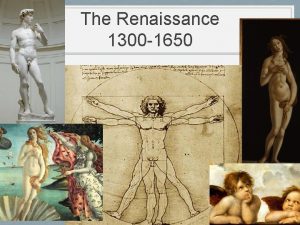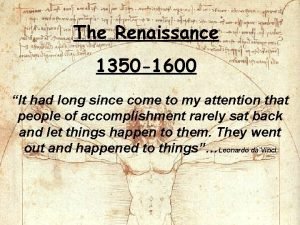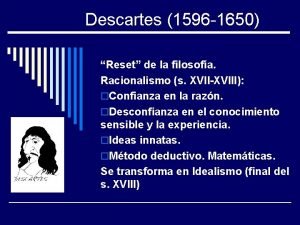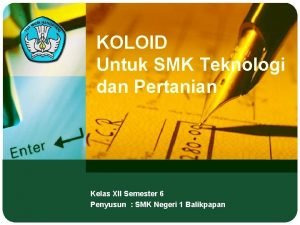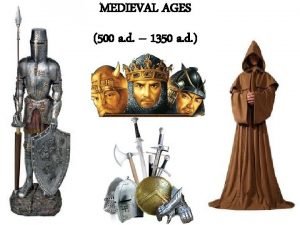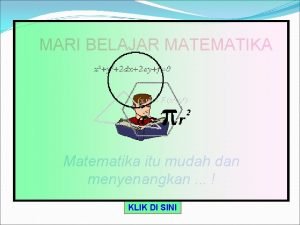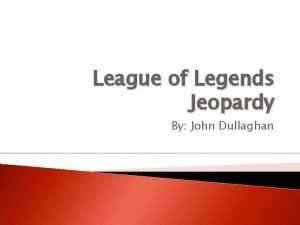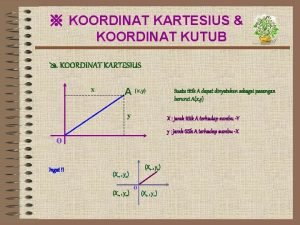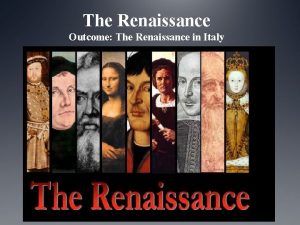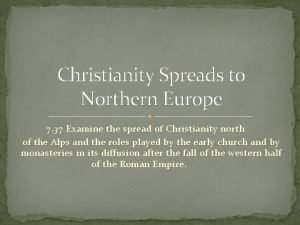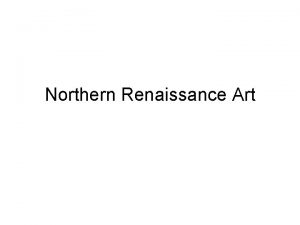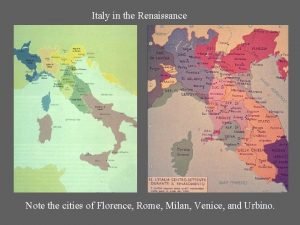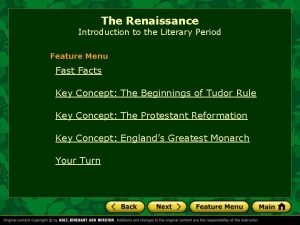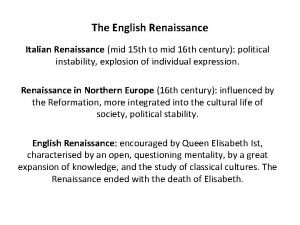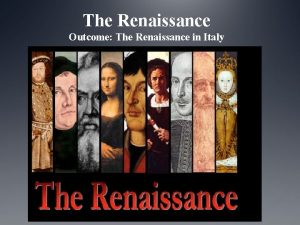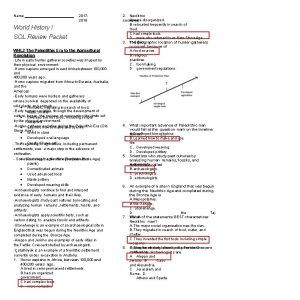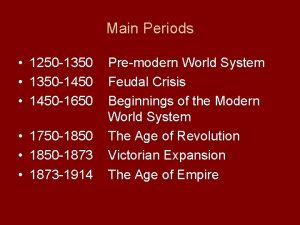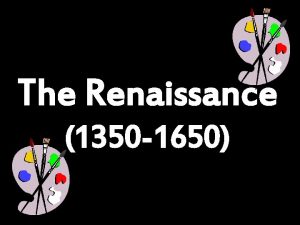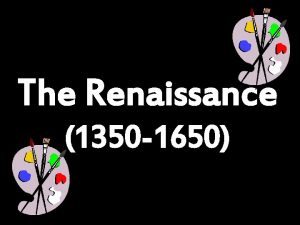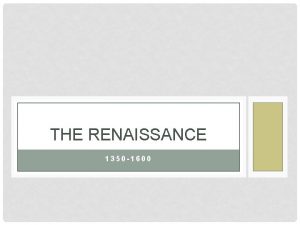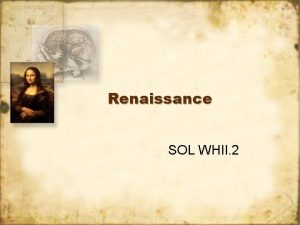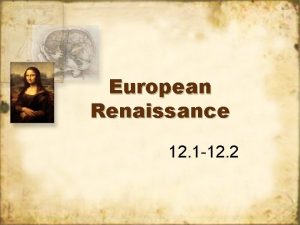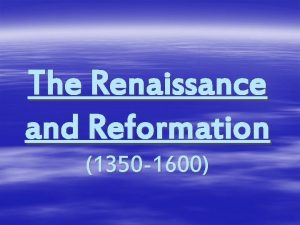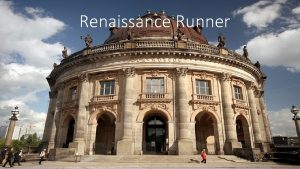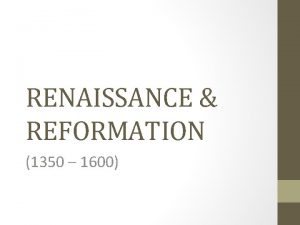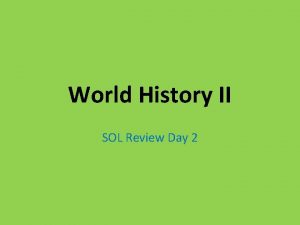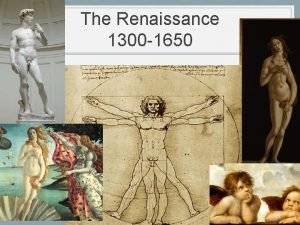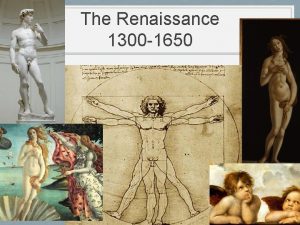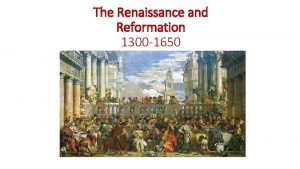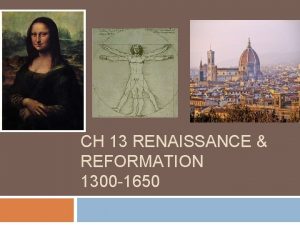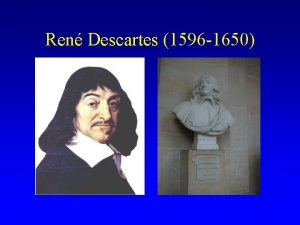The Renaissance 1350 1650 SOL WHII 2 Review





















- Slides: 21

The Renaissance 1350 -1650 SOL WHII. 2

Review of the Medieval Period/Middle Ages (750 -1500) • Europeans first introduced to the luxury goods of Asia during the Crusades • Trade grew due to the rise of cities

Cities grew when agricultural success enabled more serfs to move away from feudal manors.

Renaissance • The glorification of classical (Greek and Roman) civilizations • Rebirth of society.

• The Renaissance began around 1300 A. D. and lasted until around 1600 A. D. – It was a time of cultural awakening for Europe – The Renaissance was also a time of reforming education. People began to develop new ideas about self and the world around them.

City Life • Italy had not become unified like France and England. • 3 cities played leading roles in the Renaissance – Florence, Rome and Venice • Italy was culturally and economically more prepared for the Renaissance because : – 1) no central authority/more individual freedoms – 2) center of international trade



• The Medici family in Florence was evidence that the power of government in the city-states originated with the merchants • The Medici were a famous ruling family that were patrons of the arts and generally credited with supporting the beginning of the Renaissance. • Florence = birthplace of the Renaissance • Cosimo de’Medici: – Used taxes to make city improvements • Lorenzo “the magnificent” de’Medici: – supported artists, philosophers and writers


Humanists • Humanists believed learning about the “classics” was the key to reforming society (Society was in need of reform because of the “Dark Ages”. • Humanists believed the individual had self-dignity and worth to society. – Consequently, they strongly supported education for everyone. • Early Humanists were orators, poets, and writers. – They studied original manuscripts…. similar to studying primary sources today. – Petrarch wrote 366 sonnets (short poems) “Sonnets to Laura” – Cellini wrote one of the first autobiographies • Today, a “Renaissance Person” is one who is wellrounded and successful in many varied fields.

Political Science (the study of government) • Niccolo Machiavelli wrote “The Prince” • Advocated the idea that the end result justifies the means and provided a set of rules for rulers to take and hold power.


Artistic Achievements • Renaissance art was famous for using perspective (Depth/ 3 D). • Architecture: – Brunelleschi: • Dome design • Sculpture: – Donatello: • first since ancient times to cast a statue in bronze • Ghiberti: – 21 years to complete 10 New Testament scenes in bronze.


• Painting: – Giotto; human emotions • Masaccio: – lighting, life-like human bodies • Leonardo da Vinci: – Mona Lisa and The Last Supper • Michelangelo: – sculpted statue of David, La Pieta, Moses – 1505 – Pope Julius II hired him to paint the ceiling of the Sistine Chapel with scenes from the Bible

Don’t Look!

The Renaissance of Northern Europe • Spread of Renaissance to Northern Europe aided by invention of Printing Press (around 1440) by Johannes Gutenberg • Prior to 1500, the compass, numerical system, and silk were exchanged, but not the printing press. • The Renaissance in Northern Europe had


The Renaissance of Northern Europe • Erasmus = Christian humanist who was renowned for his accomplishments in intellectual ideas. Wrote In Praise of Folly • Thomas Moore = Utopia • William Shakespeare – English playwriter = King Lear, A Midsummer Night’s Dream, Macbeth, Romeo and Juliet – Wrote line, “What’s in a name? That which we call a rose by any other name would smell so sweet. ” • Cervantes = Don Quixote (The first novel!) • The novel became a widely popular form of literature during the 18 th century, because of its new form and it reached a much larger population.

 Renaissance timeline 1300 to 1650
Renaissance timeline 1300 to 1650 Pazzi hanging mural
Pazzi hanging mural Thermometer inventor
Thermometer inventor Renaissance 1350
Renaissance 1350 Reglas de descartes
Reglas de descartes Koloid liofil
Koloid liofil 1350 ad
1350 ad Hubungan sudut
Hubungan sudut Jeopardy league of legends
Jeopardy league of legends 1350 ce
1350 ce Jumlah sudut segi sepuluh
Jumlah sudut segi sepuluh Hubungan koordinat kartesius dan koordinat kutub
Hubungan koordinat kartesius dan koordinat kutub Cosimo de' medici
Cosimo de' medici Italian renaissance vs northern renaissance venn diagram
Italian renaissance vs northern renaissance venn diagram The renaissance outcome renaissance painters/sculptors
The renaissance outcome renaissance painters/sculptors Northern renaissance vs italian renaissance art
Northern renaissance vs italian renaissance art Last supper labeled
Last supper labeled The renaissance introduction to the renaissance answer key
The renaissance introduction to the renaissance answer key Italian renaissance vs english renaissance
Italian renaissance vs english renaissance The renaissance outcome the renaissance in italy
The renaissance outcome the renaissance in italy 4th grade va studies sol
4th grade va studies sol World history 1 sol review
World history 1 sol review
